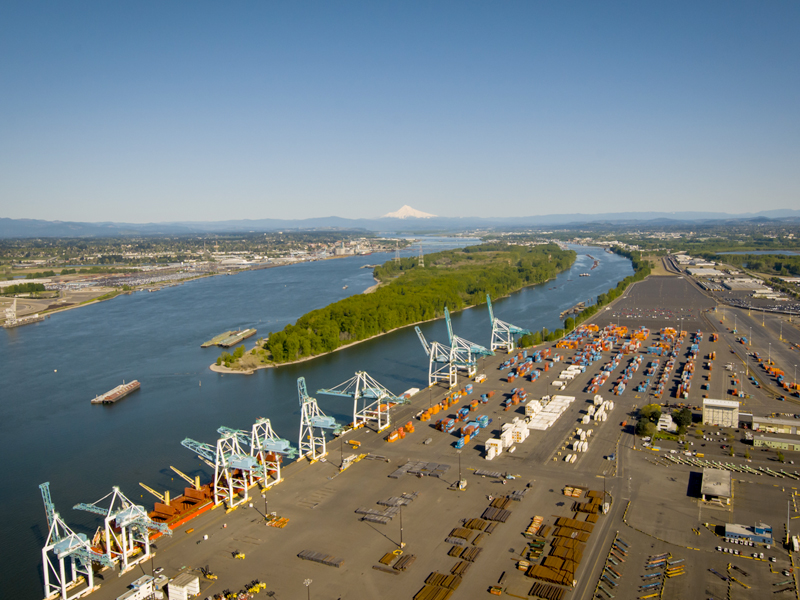
You just returned from a trade mission to Asia, during which you met with grain customers, logistics partners, container carriers, companies importing as well as exporting to our region. What are their impressions of the state of trade and specifically can you gauge their interest in doing business in Portland?
We have a lot going for us and interest is high, however our trade opportunities are hampered and helped by myriad factors. Trans Pacific Partnership is on many people’s minds, the slow-down of the Chinese economy weighs heavy, as does the exchange rate with Japan that hurts exports from here.
The low price of fuel has been a significant factor, both here and abroad. In the case of ocean freight rates, the low price of fuel means there are more global competitors to the grain produced in our region. However the low price of fuel has been helpful in their effect on inland trucking costs, and low price of fuel is likely going to have a beneficial prospective effect on international container shipping rates overall from the PNW to Asia.
What is the current state of the container terminal at T-6?
I think everybody knows that all direct-calling carriers pulled out in March and April of this year. Westwood is the only carrier that has come back, and they completed five successful ship calls at T-6, starting in July. We are extremely grateful to the commitment and courage Westwood has shown to start their service up again, and we hope that it can grow to serve more of the market in the future. We are supporting Westwood any way we can, with marketing efforts, with logistic support, with the container incentive program approved by our Commission earlier this year. T-6 is open, but unfortunately only busy at berth and busy at the gate one day per month.
What is the value of T-6 container service to the regional economy?
Direct benefits to the region-
• T-6 serves 50-70% of the regional container market with the lowest-cost international services
• T-6 provides quicker and more reliable access to import cargos, and easy delivery of cargoes destined for overseas markets
• Supports the retention & establishment of warehouse services, transload operations, and attraction of manufacturing & distribution businesses that rely on import/export logistics
• Significant payroll and local economic impacts
Indirect benefits-
• Competitive service in Portland provides a moderating influence on rates, whether or not a shipper uses a direct calling carrier or not
• Transportation impacts to the region include at least 1700 more truck moves on the regional highway system per week, adding to the congestion.
What will it take to be a successful, self-sustaining container service, meeting the needs of the region’s shippers?
We need to be busy seven days a week, hosting multiple ship calls. While there is commercial interest on the part of some carriers to return to Portland with a direct transpacific call, everyone we have spoken with is concerned about the ongoing and unresolved disputes between labor, represented by the ILWU, and the terminal management of ICTSI.
The recent Westwood’s ship calls, although export-only and relatively small, are being closely watched from abroad.
What is the Port doing to restore container service?
Port staff is working on aspects of recovery and recruitment that are in our means to effect.
Specifically, that means develop of a joint recruitment strategy that can be implemented once the terminal situation has improved. Port staff completed a study of all 38 transpacific strings and identified 3-4 target services for joint recruitment efforts with ICTSI Oregon.
Our focus is to keep the target carriers’ commercial marketing teams aware of the Port and to make a Port case for the strength of our market, ongoing eastbound and westbound opportunities for import and export. This effort will hopefully shorten the timeframe for service resumption once the labor environment improves. We are also working to strengthen and grow the Westwood service to and from Japan and Korea that we currently enjoy.
Lastly, we have a little over $3.5 million committed to a container incentive to carriers, which was important to keeping Hanjin as long as we could, and has been helpful for Westwood. However, it is more of a retention program, rather than recruitment. We are discussing changes that could redirect the incentive to recruit carriers to offset some of the costs calling Portland.
That’s international, what are you doing regionally?
Work with our partners at the State, shippers, and regional service providers to support interim programs that keep freight moving. We’ve been particularly active working Tidewater Transportation, Northwest Container Service and the ports of Lewiston and Morrow on getting cargo back onto a barge feeder service to the Columbia/Snake River System. Farmers in eastern Oregon and Washington, Idaho and Montana an area particularly hit hard by truck equipment availability and shipping alternative cost increases.
